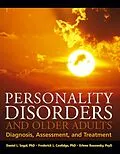The older adult population is booming in the United State and
across the globe. With this boom comes an increase in the number of
older adults who experience psychological disorders. Current
estimates suggest that about 20% of older persons are diagnosable
with a mental disorder: Personality disorders are among the most
poorly understood, challenging, and frustrating of these disorders
among older adults. This book is designed to provide scholarly and
scientifically-based guidance about the diagnosis, assessment, and
treatment of personality disorders to health professionals, mental
health professionals, and senior service professionals who
encounter personality-disordered or "difficult" older adults.
Autorentext
DANIEL L. SEGAL, PhD, is an Associate Professor in the Department of Psychology at the University of Colorado at Colorado Springs. He teaches courses in clinical psychology, conducts research on mental health and aging, and trains students in clinical geropsychology at the CU Aging Center.
FREDERICK L. COOLIDGE, PhD, is a Professor in the Department of Psychology at the University of Colorado at Colorado Springs. His research focuses on behavioral genetics and personality disorders across the lifespan.
ERLENE ROSOWSKY, PsyD, is an Assistant Clinical Professor in Psychology in the Department of Psychiatry at Harvard Medical School and is the Director of the Center for Mental Health and Aging at the Massachusetts School of Professional Psychology. Dr. Rosowsky writes a regular column for the Journal of Retirement Planning.
Klappentext
Praise for Personality Disorders and Older Adults
The authors have presented a valuable addition to the literature of geropsychology, a clinically relevant work whose virtues are its comprehensiveness, ease of understanding, and simplicity of expression.
Theodore Millon, PhD, DSc, Dean and Scientific Director Institute for Advanced Studies in Personology and Psychopathology
...a "must-have" for all clinicians working with this population and an important resource for students and trainees.
Bob Knight, PhD, University of Southern California
...[this book] should be on the bookshelf of all mental health professionals who work with "problem" clients in geriatric settings, and of all academics who want to understand the latest thinking on aging, personality, and dysfunction.
Victor Molinari, PhD, ABPPLouis de la Parte Florida Mental Health Institute University of South Florida
...this volume is a much-needed state-of-the-art compendium for both clinicians and researchers.
Michael Duffy, PhDTexas A&M University
Improving quality of life for older adults with personality disorders
This book provides a theorized pattern for each personality disorder in later life. It examines the potential impact of aging on each of the personality disorders and offers extended case examples for odd and eccentric, dramatic and erratic, and fearful and anxious personality disorders as well as other personality disorders that affect older adults: sadistic, self-defeating, depressive, passive-aggressive, and inadequate. The authors offer guidance based on scholarly research and scientific evidence. The book covers epidemiology and comorbidity, theories of personality disorders, assessment, and intervention strategies.
Personality disorder represents a tough and often frustrating challenge for clinicians. On top of this already challenging clinical situation, managing older patients entails contending with the physical and cognitive declines, social losses, reduced independence, and financial strains associated with the aging process. Armed with a better understanding of this very challenging clinical population, readers can help personality-disorderedolder adults age more gracefully and successfully, and help improve their quality of life.
Zusammenfassung
The older adult population is booming in the United State and across the globe. With this boom comes an increase in the number of older adults who experience psychological disorders. Current estimates suggest that about 20% of older persons are diagnosable with a mental disorder: Personality disorders are among the most poorly understood, challenging, and frustrating of these disorders among older adults. This book is designed to provide scholarly and scientifically-based guidance about the diagnosis, assessment, and treatment of personality disorders to health professionals, mental health professionals, and senior service professionals who encounter personality-disordered or "difficult" older adults.
Inhalt
Foreword.
Preface.
Acknowledgments.
Chapter 1. Introduction to Personality Disorders and Aging.
The Demographics of Aging.
Mental Health and Aging: The Big Picture.
Overview of Personality and Personality Disorder.
History of the Personality Disorder Category.
Modern Conceptualizations.
The DSM-IV-TR Personality Disorders.
Challenges Associated with Personality Disorder Psychopathology.
Conclusions.
About This Book.
Chapter 2. The Odd and Eccentric (Cluster A) Personality Disorders and Aging.
General Diagnostic Criteria.
Cluster A Personality Disorders: Paranoid, Schizoid, and Schizotypal.
Paranoid Personality Disorder.
Schizoid Personality Disorder.
Schizotypal Personality Disorder.
Chapter 3. The Dramatic, Emotional, and Erratic (Cluster B) Personality Disorders and Aging.
Cluster B Personality Disorders: Antisocial, Borderline, Histrionic, and Narcissistic.
Antisocial Personality Disorder.
Borderline Personality Disorder.
Histrionic Personality Disorder.
Narcissitic Personality Disorder.
Chapter 4. The Fearful or Anxious (Cluster C) Personality Disorders and Aging.
Cluster C Personality Disorders: Avoidant, Dependent, and Obsessive-Compulsive.
Avoidant Personality Disorder.
Dependent Personality Disorder.
Obsessive-Compulsive Personality Disorder.
Chapter 5. Other Personality Disorders and Aging: Sadistic, Self-Defeating, Depressive, Passive-Aggressive, and Inadequate.
Personality Disorders in DSM-III-R Appendix A and in DSM-IV-TR Appendix B.
Sadistic Personality Disorder: DSM-III-R Appendix A.
Self-Defeating Personality Disorder: DSM-III-R Appendix A.
Depressive Personality Disorder: DSM-IV-TR Appendix B.
Passive-Aggressive Personality Disorder: DSM-IV-TR Appendix B.
Inadequate Personality DisorderA Manifestation of Frontal Lobe Syndrome?
Inadequate Personality Disorder.
Chapter 6. Epidemiology and Comorbidity.
Epidemiology of Personality Disorders in Later Adult Life.
Community and Psychiatric Samples.
The Debate about Stability versus Change for the Personality Disorders.
Epidemiology and Gender.
Course and Prognosis for the Personality Disorders.
Comorbidity: General Issues.
Comorbidity of Personality Disorders with Clinical Disorders and with other Personality Disorders.
Personality Disorders and Dementia.
Conclusions.
Chapter 7. Theories of Personality Disorders: Cognitive, Psychoanalytic, and Interpersonal.
Cognitive Theories of Personality Disorders.
Cognitive Therapy Basics.
Application to Personality Disorders.
Psychoanalytic Theories of Personality Disorders.
Provinces and Instincts of the Psyche.
Neuroses, Psychoses, and Personality Disorders.
Psychoanalytic Theory and Aging.
A Brief Note about the Humanistic Approa…
